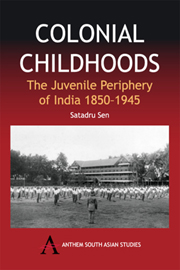Book contents
- Frontmatter
- Contents
- Dedication
- Acknowledgements
- Introduction
- 1 State of the Experiment: Experts, Parents and the Reformatory
- 2 The Nature of the Beast: The Content of Institutionalized Childhood
- 3 Experimental Childhoods: Pain and the Reformatory
- 4 Gendering the Reformatory
- 5 Masters and Servants: School, Home and Aristocratic Childhood
- 6 The Politics of Deracination
- Conclusion
- Notes
- Bibliography
- Index
- Frontmatter
- Contents
- Dedication
- Acknowledgements
- Introduction
- 1 State of the Experiment: Experts, Parents and the Reformatory
- 2 The Nature of the Beast: The Content of Institutionalized Childhood
- 3 Experimental Childhoods: Pain and the Reformatory
- 4 Gendering the Reformatory
- 5 Masters and Servants: School, Home and Aristocratic Childhood
- 6 The Politics of Deracination
- Conclusion
- Notes
- Bibliography
- Index
Summary
Liberal-utilitarian projects in colonial India were not based solely on the optimistic assumption that modern metropolitan strategies of intervention in the societies, bodies, minds and habits of undisciplined populations would produce modifications that were desirable to the colonizer. In the case of the child-correction project, we find that the optimism was accompanied from the outset by serious doubts about whether modifications could be induced in even the ‘softest’ of all native populations. As experiments with reformatories for juvenile delinquents and boarding schools for savage princelings continued into the twentieth century, these doubts accumulated into a pervasive sense of failure. This, in itself, is not surprising. It is overwhelmingly established in the post-Foucauldian historiography that disciplinary strategies rarely worked as expected, either in the peripheral space of the colony, or in the enclaves of juridical power within the metropole. Much of the time in India, reformatories and boarding schools, like prisons and hospitals, did not produce a discernible modification; they were, therefore, ‘failures’. Colonial disciplinary institutions, from this familiar perspective, were defeated by the resistance of inmates, the autonomy of their native staff, the apathy or hostility of the wider society of natives, and the British need to negotiate constantly with inmates, staff and outsiders.
The appearance of a defeated discipline is, however, misleading; there are One is to use the ‘rock / water’ analogy that Sudipta Kaviraj has used to describe the interplay between strategy and tactics in the politics of marginal urban populations.
- Type
- Chapter
- Information
- Colonial ChildhoodsThe Juvenile Periphery of India 1850–1945, pp. 211 - 214Publisher: Anthem PressPrint publication year: 2005



